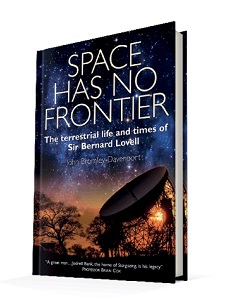British radio astronomer Sir Bernard Lovell is known to many in the space field, not least for the 250-ft radio telescope at Jodrell Bank in Cheshire which bears his name. Indeed, the telescope was rushed into service in late 1957 to track the fabled Sputnik. Of course, Lovell was known for much more than this, which is why so many books have been written about him. This latest is “an affectionate and accessible portrait of a scientific giant, commemorating…the man behind the astronomer”.
The book is presented in 25 relatively short chapters, which take a refreshingly linear journey through Lovell’s life, though it is somewhat ‘front-loaded’ in concentrating on the earlier segment of his 98-year existence. Following the Sputnik era, the volume becomes more subject-oriented with chapters entitled “Reith Lecturer”, “Space Wars” and “The Glory of the Garden” (the 40-acre arboretum adjacent to the telescope).
An interesting aside is a commentary on Lovell’s involvement in the shady world of espionage during World War II and the Cold War; as the dust jacket reports, “classified documents disclosed since his death in 2012 reveal that he even acted as a spy”. The chapter entitled “Incidental Spy” gives a more honest interpretation: “There is no doubt that his trips to Russia… were used by the security services to obtain all the information they could about Soviet installations. They encouraged him to go, regardless of the dangers; when he returned, they interviewed him at length…Whether he knew it or not, he was used as a spy”.
Frankly, this is less than surprising, given the way space scientists and engineers travel to international conferences – and did so even during the 1950s and 60s – to exchange information and learn from one another. To the heads of the security services, on both sides of the iron curtain, it must have been a ‘no-brainer’ to arrange for post-visit briefings from key players. As we all know, a pertinent, targeted question – even one posed in a pub or bar - can reveal details that would not appear in a standard travel report or scientific paper. I have no doubt that Lovell knew full well he was being useful to the State; I am also sure than his Russian hosts gained from his visits in a similar manner.
Supplemented with photo inserts, chapter notes, a glossary and an index, this is an interesting exposition of a fascinating character.











